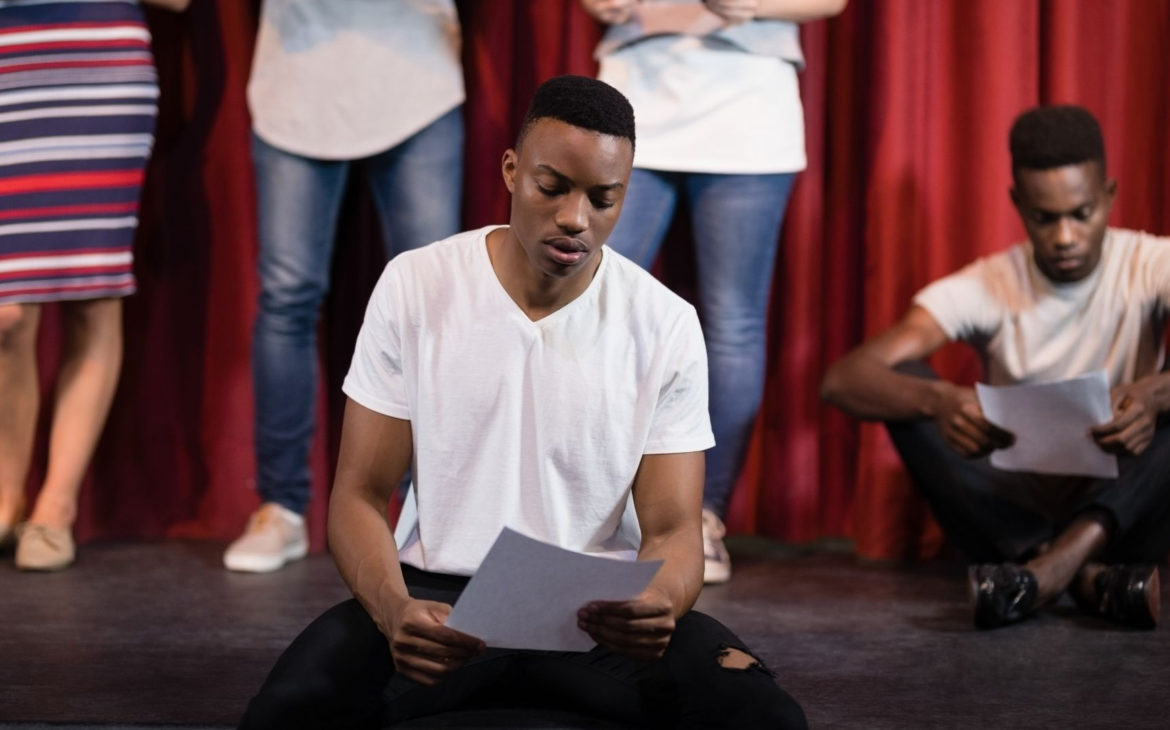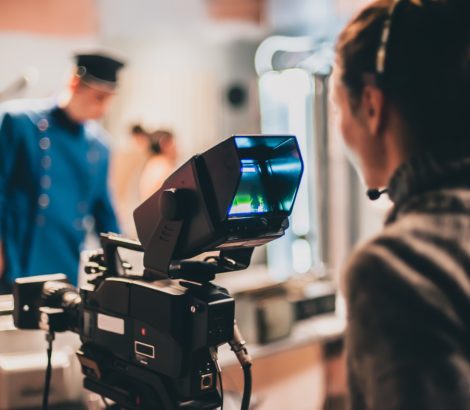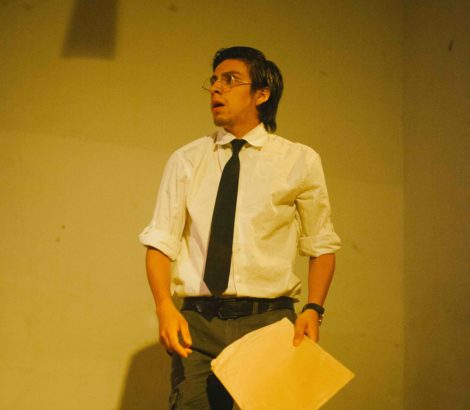Some Thoughts and Tips about Memorizing Lines

Have you ever given a great performance and then afterwards the one thing someone says is “How did you memorize all those lines?!” It always makes me want to roll my eyes and say “that’s the easiest part, the emotional preparation is the hard part.” But I don’t. I just say “lots of practice.” And that’s true too.
In my twenties, I was one of those annoying actors that could look at something twice and have it down verbatim. I used to drive my castmates crazy because I’d have all of their lines memorized somehow too. I’m still a pretty fast memorizer, but I need to spend a little more time with the text than I used to.
Everyone has a different way of learning lines and each actor has to find the best way for them. I once had a roommate that would record the other characters’ lines on and old-school cassette tape recorder and run the scene with the machine over and over again. (This was years ago, there are apps for that now!)
I’m a very visual learner, so I really like to look at the page a lot. I have a little bit of a photographic memory I guess, sort of seeing the script in my head as I’m recalling lines. Without looking, I’ll know when I’m on page three. This turns out to be very helpful during auditions when I have dialogue memorized but I still want to have the pages in my hand. I don’t even have to look down but I know exactly when to turn the page just in case I need to glance at it.
In Howard Guskin’s wonderful book “How to Stop Acting”, he talks about something he calls “taking it off the page.” Here’s how it works:
The actor looks down at the phrase and breathes in and out while he reads the words to himself, giving himself time to let the phrase into his head. Then he looks up from the page and says the line, no longer reading but speaking.
You can learn more about that here.
This is a process that Guskin uses when he coaches actors as a means of making discoveries about the character in the scene. I think it’s brilliant. It’s painstaking, but it certainly evokes a lot of insight. It is also is a great way to memorize lines. I did a play a few years ago that required me to deliver a pretty lengthy monologue. I hadn’t memorized a monologue like that since I attended The American Academy of Dramatic Arts – many, many years ago. I found that using the taking it off the page process helped me learn that monologue in no time and also helped me make discoveries, a lot of nuances, that I may have missed otherwise.
As I said, everyone learns differently. You have to find what works best for you. But here are some little things about line memorization I want to share.
1: Get good at memorizing.
If you want to be an actor, you’re going to have to memorize a lot of dialogue, and often. Like anything else, you can train your brain to be better at something by doing it consistently – so practice, practice, practice! Find a scene or monologue online and make it your goal every week to memorize something. If you’re not in an acting class, you should practice working on understanding material on a regular basis. So do more than just memorize the lines — practice creating characters, believing the imaginary circumstances, and making strong choices while you’re at it!
2: Yes, you should memorize dialogue for every audition.
I used to think this was unnecessary. In fact, I used to think it was a good thing to have the sides in your hand at an audition because I thought it subliminally showed them that I could be directed in any way they wanted. I thought it would be good for them to see that this wasn’t the final performance, I could be worked with so they could more easily imagine me in the role. Then one day a writer friend of mine showed me several audition tapes for a sitcom she had created for a major network. The difference in the performances between the actors with no sides in their hands and the actors with sides in their hands was profound. Especially in television, they want to see a final performance. They don’t want to direct you. They want you to show up on set and do exactly what they saw you do in your audition. Your audition always has to be performance-ready, whether you’re auditioning for a guest star or a series regular. There’s little to no rehearsal in television. They want to call “Action!,” watch you do your thing, call cut, and send you home. So memorize your auditions, especially for self-tapes, because you can do it as many times as you need to until it’s right. If you aren’t confident enough to let go of the sides in a live audition room, have them in your hand, but you shouldn’t need to look at them unless for one reason or another you lose your concentration and need to glance down. Sometimes your sides can also be used as props. In those instances, it’s great to have them on you because they’ll add to your performance, not distract from it.
If your audition is last minute, or it’s a cold read, at least memorize the first three lines. Jenna Fischer advises this in her book “The Actor’s Life” (a great read if you’re just getting started or thinking about pursuing a career in acting). It’s a great trick. If at least the first three lines are memorized, you know you can have a strong start to get them hooked!
3: If you keep getting stuck on the same line, you’re missing something.
I have noticed this in my own work, but it really became evident when I started coaching other actors. Whenever there was a line that is consistently being forgotten, it was almost always because the actor hadn’t connected to it emotionally yet. Or they hadn’t connected the previous moment to it yet. If there’s a line you are continually forgetting, chances are good that you are missing something about the character or emotional life. Look deeper into what the line is really about until you find the connection. Sometimes you just have to ask yourself “why is the character saying that line?” It seems like an obvious question to ask yourself but you’d be surprised how much you’re missing when you forget to slow down and really pull the scene apart.
4: It’s in the listening.
This seems obvious but so many actors forget to do it. If you’re well-prepared on the character, relationships, and imaginary circumstances, and you’re really listening to the other character’s dialogue, you should know what your next line is. Especially if the writing is good. Good writing is so much easier to memorize. Unfortunately, sometimes we don’t get great writing but we can’t let that be an excuse. No excuses! If you’re having trouble memorizing something, you probably haven’t done your homework. Do the work!
5: Chill out.
Go easy on yourself. If you’re struggling with memorizing something, or even during a rehearsal you go blank on your next line, getting frustrated and worked up will make it even harder for your brain to recall the line. The more relaxed you are in your work, the easier it is for your brain to recall information. When we are stressed, the brain secretes cortisol and adrenaline and the result is that our attention narrows to focus on the cause of the stress rather than the task at hand. There’s another reason why actors should learn to meditate!

I’m well aware that there are a lot of theories out there that encourage actors not to memorize lines, at least not at first. I wholeheartedly support this idea. In fact, when I’m teaching, I prefer students don’t memorize their scenes for scene study. If the actors don’t know the next line, they can’t anticipate the next moment, so they really have to stay in the listening, and then find their line. I think knowing your lines too well before you’ve done your preparation can lead you to making conceptual choices and playing ideas, which I’m always steering actors away from.
However, when it comes to doing the job, you’ll want to know how to memorize, a lot and quickly. When it comes to auditioning, you’ll want to know how to memorize, a lot and quickly. I don’t suggest that memorizing be the first thing you do with your script, but I do suggest that you get good at it so when the time comes, you can have confident, off-book performances.












